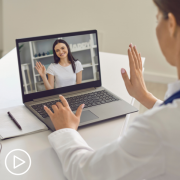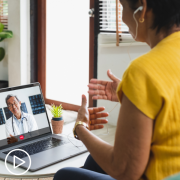What Opportunities and Challenges Does Telemedicine Present for MPN Patients? from Patient Empowerment Network on Vimeo.
For myeloproliferative neoplasm (MPN) patients, what does telemedicine offer in terms of opportunities and challenges? Expert Dr. Jamile Shammo from Rush University Medical Center shares situations when telemedicine versus in-person visits can help provide optimal MPN patient care.
See More From the MPN TelemEDucation Resource Center
Related Resource:
Transcript:
Dr. Jamile Shammo:
I think the medicine has provided a tremendous opportunity for us to take care of patients in general, MPN patients in particular during the pandemic. We obviously wanted to minimize the exposure of patients to COVID during the pandemic, but patients who have MPN as well as other hematological malignancies needed to have CBCs frequently to make sure that the treatments that they were on were safe, that they were doing what they were supposed to do in terms of controlling their counts. So, then there was no escaping that. And they also needed to get ahold of their doctor, so being able to do both, perhaps away from the hospital in some type of clinic and being able to connect with the physician online to discuss the results of the CBC that they had obtained in perhaps a less populated lab was tremendous. And granted, this had made it feasible to care for patients during the pandemic. But now that we are sort of emerging from the pandemic, people are realizing that perhaps those technologies are there to stay, and perhaps there’s a subset of patients that may still be able to benefit and take advantage from those resources, so we are learning as we go who may be able to continue to do this.
I have to say though, that that may not be for every patient, and I still feel like there’s a particular type of MPN patient that will benefit from seeing the physician and having a full exam once every so often. And we can talk about the particular application that that may be, but granted telemedicine has certainly provided a tremendous advantage during COVID.
So, when I think of the patient that might benefit most from seeing the physician via televisit, for example, it would be someone who perhaps has a stable disease. Someone who I may want to monitor perhaps every three to six months, someone who may have stable counts, and we’re just talking to about their symptoms and monitoring those types of things every so often. And perhaps I look at the labs and you can discuss their symptoms and whether or not they have splenomegaly and issues like that. Someone who may already be on a stable dose of medication and we don’t have to do any dose adjustments and even if we have to do those adjustments, perhaps we could do labs a little more frequently, so that would be all right too, but someone in whom I would like to initiate in treatment, someone in whom the disease may be progressing a little too quickly, someone who I may want to do an exam and assess their spleen, I suppose you could send them to an ultrasound facility and obtain an MRI or a CT, or an ultrasound of the imaging study that is. But there’s nothing like an actual exam of the patient. You are thinking about the disease progression, so those sorts of patients in which the disease is actually changing its pace, you may want to take a look at it, the full smear look and examine the skin for certain TKI and signs and symptoms of low platelets and that sort of thing. Look in the mouth for ulcers and things of that nature. Those are the patients that I feel like would benefit the most from seeing their physician of course, the patient who has questions and that that could be probably beyond what a televisit could do. I think those would be the types of situations where you would like to have a physical presence and discuss things that would be of extreme importance to the patient’s physical health, psychological health, and of course, labs that you may want to obtain beyond the regular CBC that a standard lab could obtain outside of your institution. There are specialized labs that not every leg outside of your own tertiary care center may be able to provide, and that is something that we need to all the time. Let’s say a patient may require a bone biopsy, well then you have to have them physically be in your place, and then you might as well, then see them, examine them and do all of the labs, and that’s the other thing that we would like to do is perhaps to bundle all of the tests that you would be minimizing the exposure of patients to frequent visits so that you would be again, lessening the exposure, potentially infections.







